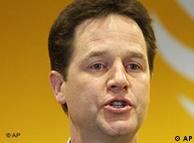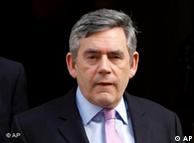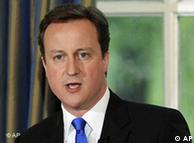Election: Cameron makes offer to Lib Dems on government | ||
 Cannot play media.You do not have the correct version of the flash player. Download the correct version David Cameron on his party's "big, open, comprehensive offer" to the Lib Dems David Cameron has reached out to the Liberal Democrats in an effort to form a government - after the UK general election resulted in a hung parliament. The Tory leader, whose party won most seats but was short of a majority, said he wanted to make a "big open and comprehensive offer" to the Lib Dems. BBC political editor Nick Robinson said it could include Lib Dems in cabinet. Labour leader Gordon Brown has already stressed his party's "common ground" with the third biggest party. Mr Cameron spoke to his Lib Dem counterpart Nick Clegg by phone on Friday afternoon in what has been described to the BBC as a "very constructive" conversation. However, there was little discussion of details. Further talks are due on Friday evening, during a meeting involving the Conservatives' George Osborne, William Hague, Oliver Letwin and Mr Cameron's chief of staff, Ed Lewellyn. Chris Huhne, Danny Alexander, Andrew Stunnell and David Laws will represent the Lib Dems.
With results from all 649 constituencies contested on 6 May now declared, the Tories have got 306 seats - or 307 including the previously Tory held Thirsk and Malton where the election was postponed after the death of a candidate. It leaves the party just short of the 326 needed for an outright majority. Labour have finished with 258 MPs, down 91, the Lib Dems 57, down 5, and other parties 28. The Conservatives got 36.1% of votes (up 3.8%), Labour 29.1% (down 6.2%) and the Lib Dems 23% (up 1%). Past practice under Britain's unwritten constitution sees the sitting prime minister in a hung parliament having the right to make the first attempt at forming a ruling coalition. But Mr Cameron said Mr Brown had "lost his mandate to govern" after the Conservatives won the most votes and the most seats. And Nick Clegg, leader of the third biggest party, the Lib Dems, said he believed the result gave the Tories the right to seek to govern first. Mr Cameron referred to the "outgoing Labour government" in his speech. But Mr Brown said he was making his statement "as prime minister with a constitutional duty to seek to resolve the situation for the good of the country". The Conservative leader said talks would begin with other parties. He said one option was to offer them reassurances about certain policy areas - then try to govern as a minority Conservative government. But he said it might be possible "to have stronger, more stable, more collaborative government than that". 'Common ground' "I want to make a big, open and comprehensive offer to the Liberal Democrats. I want us to work together in tackling our country's big and urgent problems - the debt crisis, our deep social problems and our broken political system," he said. While there were policy disagreements between the Tories and Lib Dems - including on the European Union and defence - there were also "many areas of common ground". The Conservatives agreed with the Lib Dem on ideas such as a "pupil premium" in schools, a low-carbon economy, tax reform and shared opposition to Labour's ID cards scheme. But he did not pledge a referendum on changing the voting system - a key concern of the Lib Dems - instead offering an "all party committee of inquiry on political and electoral reform". "I think we have a strong basis for a strong government. Inevitably the negotiations we're about to start will involve compromise. That is what working together in the national interest means," Mr Cameron said. This content requires Flash Player version 9 (installed version: No Flash Flayer installed, or version is pre 6.0.0) BBC political editor Nick Robinson said Mr Cameron had not ruled out a coalition, with places for Liberal Democrats in a Conservative-led government. But he said while he doubted the Lib Dems would take them up on the offer, they might be prepared to let Mr Cameron govern by not voting down the Queen's Speech or Budget. Taking that option would allow them not to be tainted by decisions they did not like. However former Conservative prime minister Sir John Major told the BBC offering the Lib Dems cabinet seats was "a price, in the national interest, that I personally would be prepared to bear" for the formation of a stable government able to manage the economic crisis. However, Lib Dem energy spokesman Simon Hughes said he doubted whether Mr Cameron could deliver enough electoral reform to satisfy his potential partners. "Whether he can carry his shadow cabinet with him... remains to be seen. There are some very die-hard people in the Tory Party," he told Channel 4 News. Earlier, outside No 10, Mr Brown said he would be "willing to see any of the party leaders" adding: "I understand and completely respect the position of Mr Clegg in stating that he wishes first to make contact with the leader of the Conservative Party."  Cannot play media.You do not have the correct version of the flash player. Download the correct version Gordon Brown: ''I would be willing to see any of the party leaders'' But he added "should the discussions between Mr Cameron and Mr Clegg come to nothing... I would be prepared to discuss with Mr Clegg the areas where there may be some measure of agreement between our two parties". He said there were areas of "substantial common ground" - including reforming the voting system and plans to ensure economic stability, he said. He also said he did not expect a swift conclusion to the uncertainty surrounding the election result - saying the voters had given their verdict and it was now "our responsibility now to make it work for the national good". BBC political correspondent Iain Watson said Mr Brown's message was directed at Lib Dem supporters - spelling out what a Labour government would offer them in the hope of getting them to put pressure on Mr Clegg not to do a deal with the Conservatives. Mr Clegg - whose party has done worse than in 2005 despite favourable opinion polls - said that he believed the Tories had gained the "first right" to attempt to form a government in the "national interest". Speaking outside Lib Dem headquarters in London, he said: "It is vital that all parties, all political leaders, act in the national interest and not out of narrow party political advantage." He also admitted it had been a "disappointing night" for the Lib Dems. Downing Street has authorised the civil service to support other parties in hung parliament negotiations - essentially giving the go-ahead for talks to begin. In other election night news:
The Conservatives are on course to win 40% of the vote in England and made significant gains in Wales - where Labour also regained their former stronghold Blaenau Gwent. But in Scotland they failed to make a significant breakthrough, while the Labour vote held up, with the party re-taking two seats it lost in by-elections - Glasgow East and Dunfermline and West Fife. Northern Ireland's First Minister, DUP leader Peter Robinson lost his seat, as did the other main unionist leader - Sir Reg Empey. | ||
Elections | 07.05.2010
Britain's Conservatives seek to cut deal with Liberals
Conservative Party leader David Cameron said Friday he was ready to offer a "big comprehensive and open offer" to the Liberal Democrats to work together after the closest UK general election in decades.
The Conservatives gained the largest number of seats in Britain's lower house of parliament, but failed to secure an overall majority.
Despite losing a large number of seats, the country's Labour Party could also form a government if the Liberals and Conservatives are unable to work together.
 Bildunterschrift: Großansicht des Bildes mit der Bildunterschrift: Britain's Liberal Democrat Party is playing kingmaker
Bildunterschrift: Großansicht des Bildes mit der Bildunterschrift: Britain's Liberal Democrat Party is playing kingmaker
Cameron said on Tuesday afternoon that he would negotiate with the Liberal Democrat leader Nick Clegg, who had earlier said he aimed to reach agreement with the party that had the largest number of seats.
At a press conference, the Conservative leader welcomed the Liberal position.
"Nick Clegg has said that, because the Conservative Party won the most votes and the most seats in this election, we should have the chance to form the government and I thank him for that," said Cameron. "So we will now begin talks with other parties, to see how that can be done."
Cameron said that he might seek to form a government with minority parties other than the Liberal Democrats. However, he said, a deal with the Liberal Democrats might provide "stronger, more stable government" adding that his party was prepared to implement mutually acceptable parts of the Liberal election manifesto. Cameron stopped short of offering to offer the Liberals their key demand for reform of Britain's first-past-the-post electoral system.
Brown's 'respect for decision'
British Prime Minister Gordon Brown, who remains in office for the time being, had earlier spoke outside his official residence 10 Downing Street.
 Bildunterschrift: Großansicht des Bildes mit der Bildunterschrift: Britain's Prime Minister Gordon Brown remains in office for now
Bildunterschrift: Großansicht des Bildes mit der Bildunterschrift: Britain's Prime Minister Gordon Brown remains in office for now
Brown said he respected the decision of Clegg to meet Cameron and said they should "be entitled to take as much time as they feel necessary."
"Clearly should the discussions between Mr. Cameron and Mr. Clegg come to nothing then I would of course be prepared to discuss with Mr. Clegg the areas where there may be some measure of agreement between our two parties," he said.
Brown added that immediate action should be taken on electoral reform.
With the results for 649 of 650 seats declared, the Conservatives had 306, with Labour on 258 and the Liberal Democrats on 57.
Britain's election watchdog launched an investigation on Friday after reports that queuing voters across the country were blocked from casting ballots after the official closing time. The Electoral Commission pledged to undertake "a thorough review” into allegations that officials were caught off-guard by a late surge in voting.
rc/Reuters/dpa/AFP
Editor: Rob Turner

沒有留言:
張貼留言